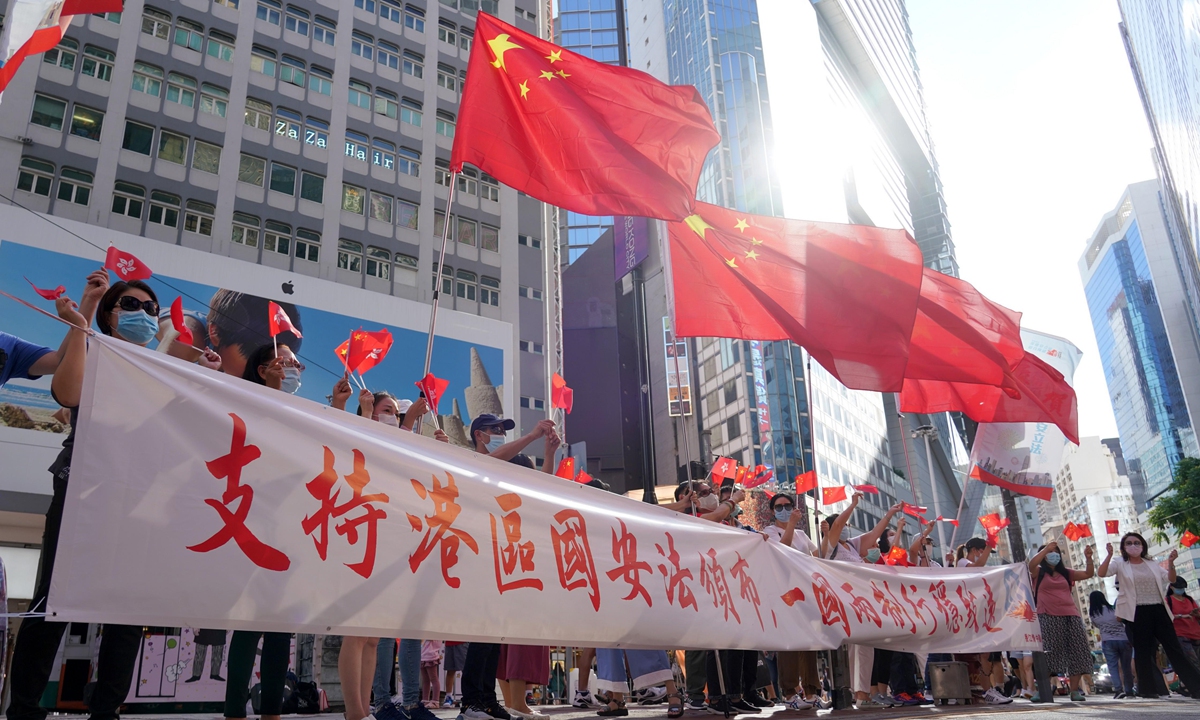
Hong Kong residents converge on the streets of Causeway Bay on June 30, 2020 to celebrate the 23rd anniversary of returned to China and the enactment of the National Security Law. Photo: VCG
Visa issuance is a matter of sovereignty, and the Hong Kong Special Administrative Region (HKSAR) government has the right to make decisions on visa applications based on "one country, two systems" and the Basic Law of the HKSAR, the Chinese Foreign Ministry spokesperson said on Monday in response to the recent handling of the visa renewal procedures for a journalist from The Economist.
The Immigration Department of the HKSAR government said on Sunday it would not comment on individual cases when asked about the reported rejection of the visa renewal for Sue-lin Wong, an Australian correspondent from The Economist. The local authorities handle each application in accordance with relevant laws and policies, according to the statement.
Wong claimed that her application to renew her visa was refused, sparking criticism from the West over the deteriorating environment for foreign journalists in the HKSAR.
"The immigration office won't comment on individual cases, but it will handle each application in accordance with relevant laws and policies," the Immigration Department said in an email sent to the Global Times.
Although the immigration office did not specify the reason for reportedly rejecting Wong's visa renewal, some Western media connected the case to "freedom of press" in Hong Kong, with the Guardian saying that denying the visa to the journalist was a "latest media blow."
"Hong Kong authorities have the authority to accept, delay or refuse an application for a work visa from anyone, and there is no need to exaggerate the individual case as it's common practice in Western society that a visa application is rejected or withdrawn if there are any suspicions," Chu Kar-kin, a member of the Chinese Association of Hong Kong and Macao Studies and veteran current affairs commentator based in Hong Kong, told the Global Times on Sunday.
Chu noted that the problem may have come from the applicant's previous words and deeds that are inconsistent with the scope of work and the nature of the visa.
Slandering the HKSAR government for intruding on press freedom or violating human rights is just another example of making exaggerations to scare others, the expert noted.
"Even if conditions are set for a work visa, there's demand and supply, and there's no need for a public explanation for entry policy or security," Chu said.
It is not the first time that foreign media have hyped up the so-called deteriorating environment for foreign media outlets since the implementation of the national security law for Hong Kong.
"Relevant authorities of the HKSAR government has already offered a principled response to this," Zhao Lijian, spokesperson of the Chinese Foreign Ministry, said during a routine press briefing on Monday. "Since the implementation of the Law on Safeguarding National Security in Hong Kong, social stability has been restored, the legal system has been improved, and Hong Kong residents and all Hong Kong-based journalists have enjoyed their lawful rights and freedoms including press freedom."
The number of overseas media outlets and media correspondents coming to Hong Kong have also increased, Zhao remarked, adding that as of April 2021, foreign media outlets in Hong Kong employ a total of 628 foreign nationals with work visa, up by 98, or 18.5 percent year-on-year.
"Take The Economist for example. During the past year, the number of its foreign employees increased by 22 percent. The figures do not lie," Zhao said, noting that "we hope relevant sides will abide by press ethics and conduct Hong Kong-related reporting in an objective and just manner."




